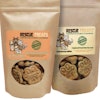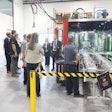Innovators are taking inspiration from human healthcare trends such as supplements, weight loss and stress management, and offering new convenient products and services to pet owners, says GlobalData, a leading data and analytics company.
GlobalData’s latest report, ‘Success Case Study: Tails.com’, notes that artificial intelligence (AI) and the resulting flexibility in manufacturing processes is unleashing the potential for personalized food menus for individual pets.
Richard Parker, Principal Consumer Insight Analyst at GlobalData, comments: “Tails.com has succeeded in building a successful online subscription business based on the fact that 66% of pet owners are always or often influenced by how well a product is attuned to their pet’s specific needs and personality.* This can be taken in tandem with the prevalence of health and wellness considerations to underline the market for very specific pet food provision that goes beyond meeting health and nutrition needs of basic age groups (such as puppy and senior) to offer something very individual in nature.”
This technology has a demographic dimension. Millennials and Gen Z are viewed as digital natives, born into and expecting ever greater convenient digitalization of their lifestyles, products and services. This makes them most likely to seek out and embrace digitally personalized, direct-to-consumer services. Indeed, many subscription-based brands such as Tails.com have a core constituency among young adults. GlobalData reports that Millennials are the leading demographic for pet ownership globally (73%), and Gen Z/iGen are the leaders in choosing personalized products for their specific pets.
Parker further comments: “To access this emerging pet food category, it will be necessary to challenge the norms of mass production and innovate processes that offer individualized feed combinations. Tails.com has proved this can be done to a high degree of customization on an industrial scale with efficient online and algorithmically-driven inputs, combined with flexibility in core ingredients and the ability to mix them precisely.
“The key challenge will be for an existing pet food business to adapt, but this is clearly possible, and likely increasingly desirable as personalized nutrition cuts into the generic retail pet food market.”
*GlobalData 2018 Q4 global consumer survey












